About Me
My name is Mohsen. I am an applied mathematician with experience in data-driven/statistical modeling, Monte Carlo methods, density estimation, particle method, variance reduction, and optimal transport, with applications in rarefied gas and plasma dynamics as well as generative AI.
I am currently a Research Affiliate at MIT. During 2023-2025, I worked on the optimal transport problem as a researcher at ETH/PSI in Switzerland. There, in collaboration with Dr. Andreas Adelmann and his team, I was involved in upgrading OPAL (Object Oriented Particle Accelerator Library) to be exa-scalable and portable (HPC) for simulation of particle accelerators. Before that in Dec. 2021, I joined MIT, USA, and worked with Prof. Nicolas Hadjiconstantinou on developing a general-purpose variance-reduced Monte Carlo method for kinetic equations. Before that, I worked with Prof. Laurent Villard at the Swiss Plasma Center (EPFL), Switzerland, as a postdoc on a particle-in-cell code for simulating plasma in confined geometry called ORB5. I carried out my doctoral studies at RWTH Aachen University, Germany, under the supervision of Prof. Manuel Torrilhon and Prof. Hossein Gorji. My dissertation was about developing efficient Monte Carlo methods for simulating dense gas, liquid, and phase transition descriptions in kinetic theory.
Projects
Statistical Modelling for Molecular Dynamics
In this line of research, we designed a stochastic process for modeling short and long-range interactions of monatomic particles that follows the exact kinetic equation up to desired moments with a feasible computational complexity that scales linearly with the number of particles. For details on the developed method, see [6, 7, 8]. These methods have been implemented in a particle-in-cell code called PICLas. As a showcase, here a simulation of Argon's density experiencing the spinodal decomposition is presented.
Excitation of Confined Plasma
Stabilizing a confined plasma in a fusion device is one of the main challenges in designing such a system. Often, it is worthwhile to study the growth/dissipation rates of modes of the system. I have worked on linear/non-linear excitation of Alfven modes in a confined plasma using a well-established particle-in-cell and gyrokinetic code called ORB5. As a showcase, electrostatic and magnetic potential fields are shown here where the mode of interest is successfully excited using a so-called antenna. For more details, see [14].
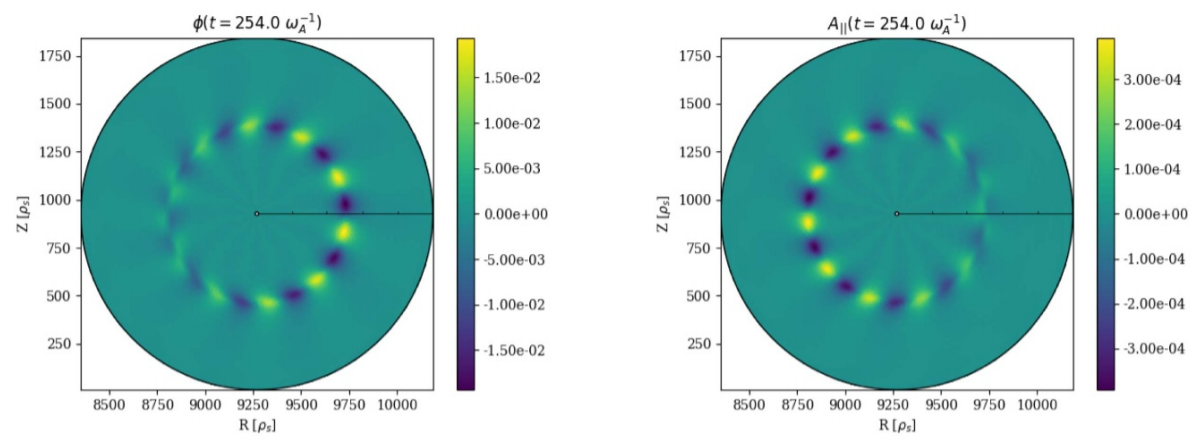
Variance Reduction Method
One of the main challenges in interpreting the solution of statistical models is noise. We have developed a general-purpose and entropy-based variance reduction method for stochastic processes where the target density is around an equilibrium/control-variate density. In this project, we devised a consistent and least-biased evolution equation for the importance weights of the Boltzmann and Fokker-Planck equation. The following figures show the snapshot estimate of number density, bulk velocity, and temperature for the Sod-Shock tube test case. We also show how the noise varies with respect to the signal for the standard Monte Carlo and the introduced variance reduction method. For details, see [4] and [5].
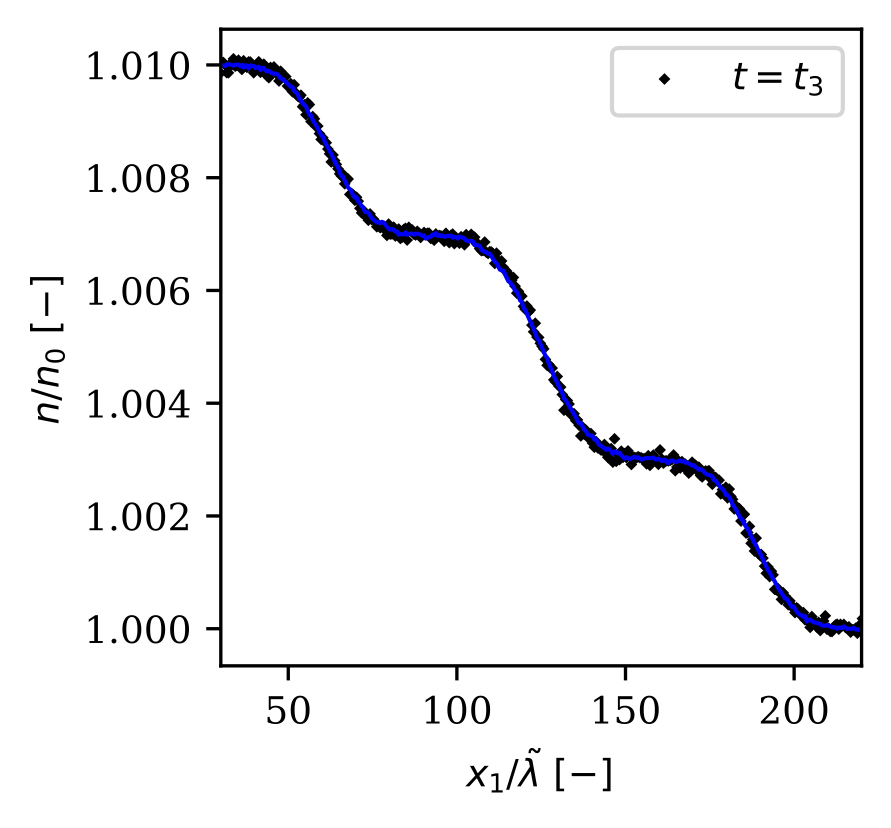
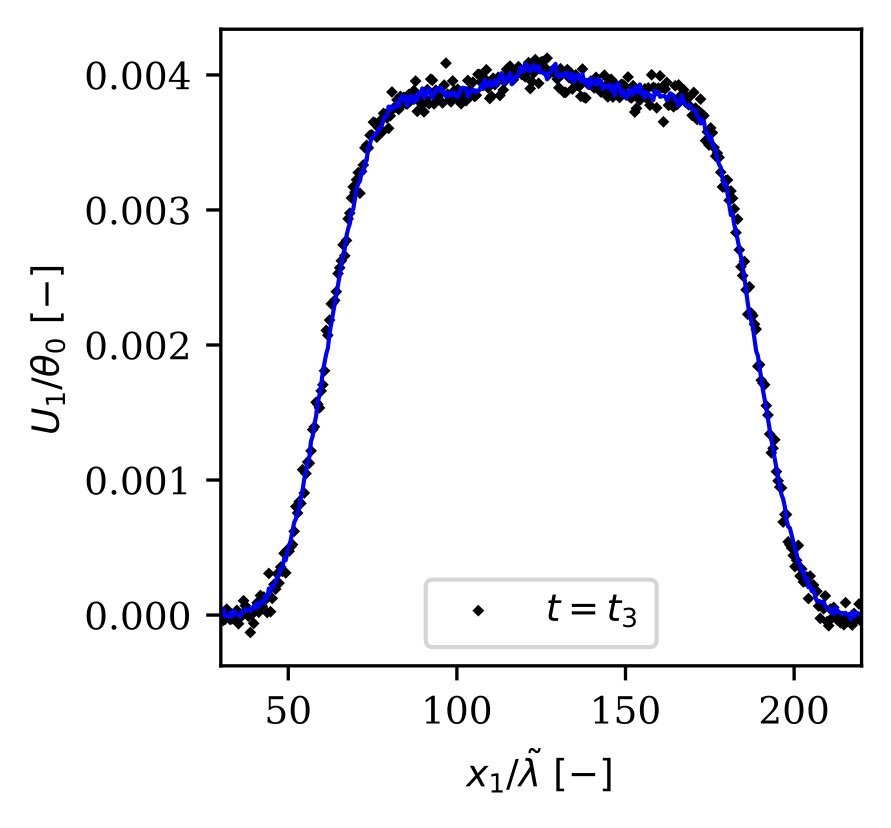
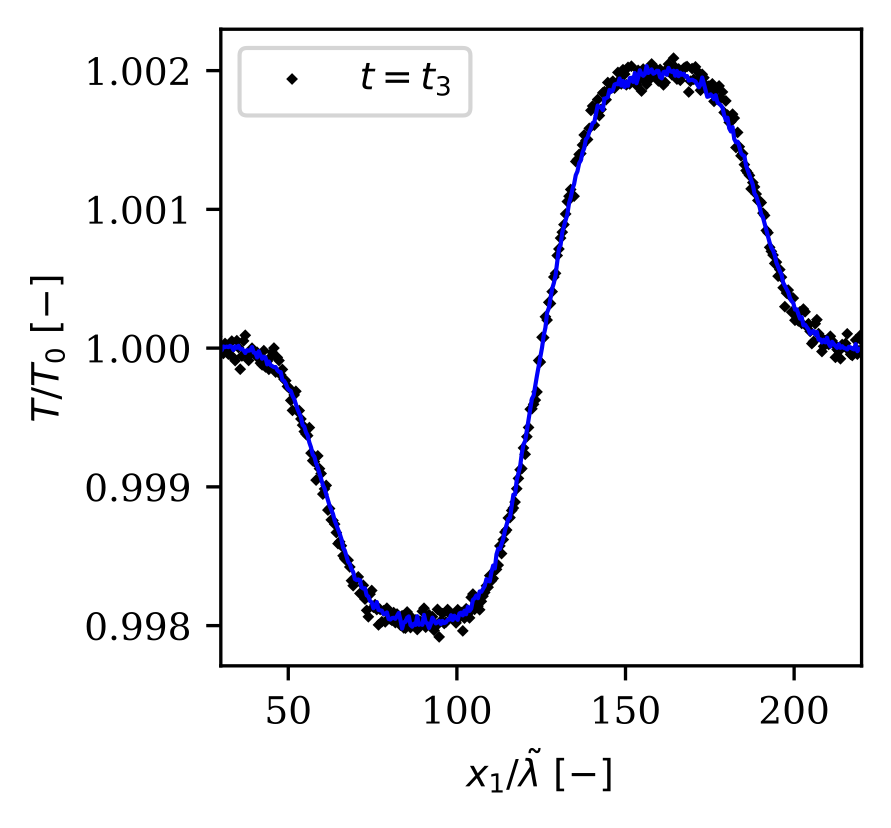
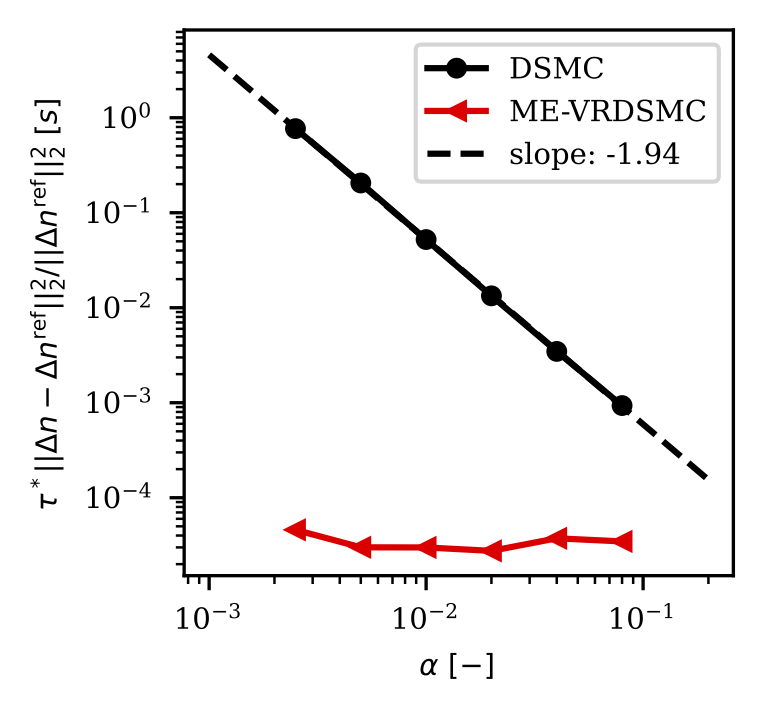
Optimal Transport Problem
Finding the optimal map/plan between marginals is one of the most attractive problems in applied mathematics with applications in data-driven modeling and Machine Learning. I am interested in devising new dynamical systems to solve this problem more efficiently than standard methods. This includes collision-based dynamics [1], orthogonal coupling dynamics [2], and moment-based methods [3]. As a showcase, here I show the output of a generative model trained using the optimal map between the normal and four other marginals.
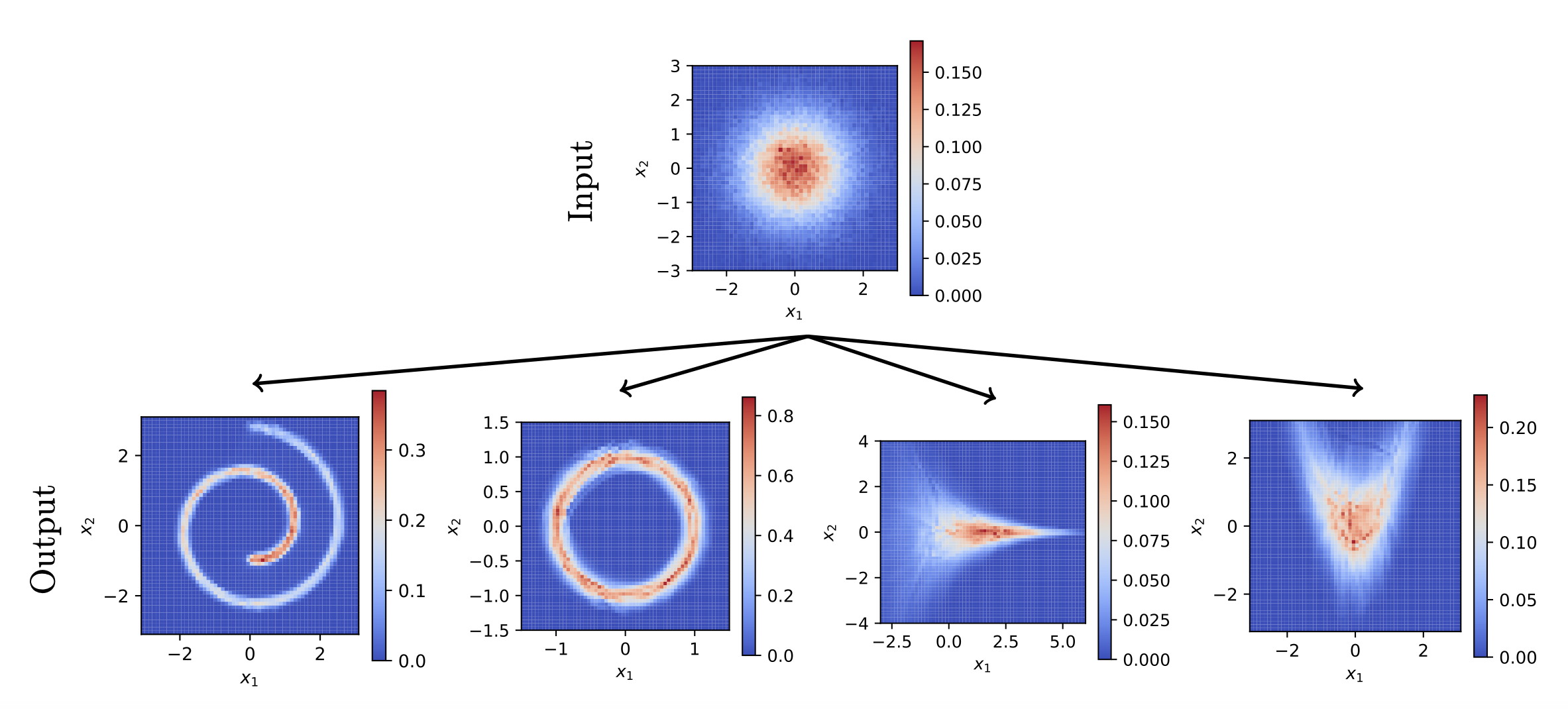
Experience
Research Affiliate at Massachusetts Institute of Technology
Department of Mechanical Engineering
USA, July. 2025 - present
Scientist at ETH, Paul Scherrer Institute
Scientific Computing, Theory and Data
Switzerland, Jul. 2023 - June 2025
Fellow at Massachusetts Institute of Technology
Department of Mechanical Engineering
USA, Dec. 2021 - Jun. 2023
Scientific Collaborator at EPFL
Swiss Plasma Center
Switzerland, Oct. 2020 - Nov. 2021
Education
Ph.D. in Applied and Computational Mathematics
RWTH Aachen University, Germany, 2020
Master's in Simulation Sciences
RWTH Aachen University, Germany, 2017
Awards & Honors
- Member of the team that won EUROfusion and SNSF project grant (consortium of national fusion research institutes, EU) in 2021.
- Won the national Walter Benjamin scholarship offered by German research foundation (DFG) in 2020.
- Won the international grant from German academic exchange service (DAAD) in 2019.
Publications
-
Optimal Transport:
- 1. Mohsen Sadr and Hossein Gorji. "Collision-based dynamics for multi-marginal optimal transport" 2024 [Preprint | Code].
- 2. Mohsen Sadr, Peyman Mohajerin Esfehani, and M. Hossein Gorji. "Optimal transportation by orthogonal coupling dynamics" 2024 [Preprint | Code].
- 3. Mohsen Sadr, Nicolas G. Hadjiconstantinou, and M. Hossein Gorji. "Wasserstein-penalized Entropy closure: A use case for stochastic particle methods" Journal of Computational Physics , 2024 [Elsevier | Preprint | Code]. Variance Reduction:
- 4. Mohsen Sadr, and Nicolas G. Hadjiconstantinou. "A variance-reduced direct Monte Carlo simulation method for solving the Boltzmann equation over a wide range of rarefaction" Journal of Computational Physics, 472, 111677, 2023 [Elsevier | Preprint].
- 5. Mohsen Sadr, and Nicolas G. Hadjiconstantinou. "Variance reduced particle solution of the Fokker-Planck equation with application to rarefied gas and plasma dynamics" Journal of Computational Physics, 492, 112402, 2023 [Elsevier | Preprint]. Modelling Phase Transition:
- 6. Mohsen Sadr, Marcel Pfeiffer, and M. Hossein Gorji. "Fokker-Planck-Poisson kinetics: multi-phase flow beyond equilibrium" Journal of Fluid Mechanics, 920, A46, 2021 [Cambridge University Press | Preprint].
- 7. Mohsen Sadr, and M. Hossein Gorji. "Treatment of long-range interactions arising in the Enskog–Vlasov description of dense fluids" Journal of Computational Physics, 378, 129-142, 2019 [Elsevier | Preprint | Code].
- 8. Mohsen Sadr, and M. Hossein Gorji. "A continuous stochastic model for non-equilibrium dense gases" Journal of Physics of Fluids, 29, 122007, 2017 [American Institute of Physics | Preprint | Code]. Data-Driven Modelling:
- 9. Mohsen Sadr, Tony Tohme, and Kamal Youcef-Toumi. "Data-driven discovery of PDEs via the adjoint method", 2024 [Preprint | Code].
- 10. Tony Tohme, Mohsen Sadr, Kamal Youcef-Toumi, and Nicolas G. Hadjiconstantinou. "MESSY Estimation: Maximum-Entropy based Stochastic and Symbolic densitY Estimation" Transactions on Machine Learning Research, 2023 [Preprint | Code].
- 11. Mohsen Sadr, Manuel Torrilhon, and M. Hossein Gorji. "Gaussian Process Regression for Maximum Entropy Distribution" Journal of Computational Physics, 418, 109644, 2020 [Elsevier | Preprint]. Approximating Collision Operator:
- 12. Fabian Mies, Mohsen Sadr, and Manuel Torrilhon. "An efficient jump-diffusion approximation of the Boltzmann equation" Journal of Computational Physics, 490, 112308, 2023 [Elsevier | Preprint].
- 13. Mohsen Sadr, Qian Wang, and M. Hossein Gorji. "Coupling kinetic and continuum using data-driven maximum entropy distribution" Journal of Computational Physics, 444, 110542, 2021 [Elsevier | Preprint]. Simulation of Plasma/Fluid:
- 14. Mohsen Sadr, Alexey Mishchenko, Thomas Hayward-Schneider, Axel Koenies, Alberto Bottino, Alessandro Biancalani, Peter Donnel, Emmanuel Lanti, and Laurent Villard. "Linear and nonlinear excitation of TAE modes by external electromagnetic perturbations using ORB5" Plasma Physics and Controlled Fusion, 64, 085010, 2022 [IOP Publishing Ltd (open access)].
- 15. P Donnel, J Cazabonne, L Villard, S Brunner, S Coda, J Decker, M Murugappan, and M Sadr. "Quasilinear treatment of wave–particle interactions in the electron cyclotron range and its implementation in a gyrokinetic code" Plasma Physics and Controlled Fusion, 63, 064001, 2021 [IOP Publishing Ltd (open access)].
- 16. Sima Farazi, Mohsen Sadr, Seongwon Kang, Martin Schiemann, Nikita Vorobiev, Viktor Scherer, Heinz Pitsch. "Resolved simulations of single char particle combustion in a laminar flow field" Fuel, 201, 15-28, 2017 [Elsevier].
Presentations
- 5th Mathematical and Scientific Machine Learning, Naples, Italy, August 2025 [poster].
- 30th Biennial Numerical Analysis Conference, Glasgow, UK, June, 2025, [talk].
- 4th Mathematical and Scientific Machine Learning, Providence, USA, June 2023 [poster].
- 19th European Fusion Theory Conference, virtual, October 2021 [poster].
- 9th International Congress on Industrial and Applied Mathematics, Valencia, Spain, July 2019 [poster].
- 10th International Conference on Multiphase Flow, Rio de Janeiro, Brazil, May 2019 [talk].
- 3rd European Conference on Non-Equilibrium Gas Flows, Strasbourg, France, February 2018 [talk].
- Swiss Plasma Center, EPFL, April, 2025.
- PSI, CSD Scientific Retreat, March, 2024.
- PSI, Machine Learning Seminar Series, April, 2024.
- MIT, Symposium of Center for Computational Science & Technology, March, 2023.
- Swiss Plasma Center, EPFL, April, 2020.
- EPFL, Mathematics Institute of Computational Science and Engineering (MATHICSE), July, 2019.
- ETH Zurich, Institute of Fluid Dynamics, May, 2018,
- ETH Zurich, Institute of Fluid Dynamics, August, 2017.
Conferences
Invited Talks
Review
- Journal of Computational Physics
- Physics of Fluids (POF)
- Computer Physics Communications
- International Conference on Learning Representations (ICLR)
- Meccanica
- Advanced Powder Technology
- Photonics
I am an active referee of the following peer-reviewed journals/conferences:
Contact
You can reach me at mohsen.sadr@icloud.com.